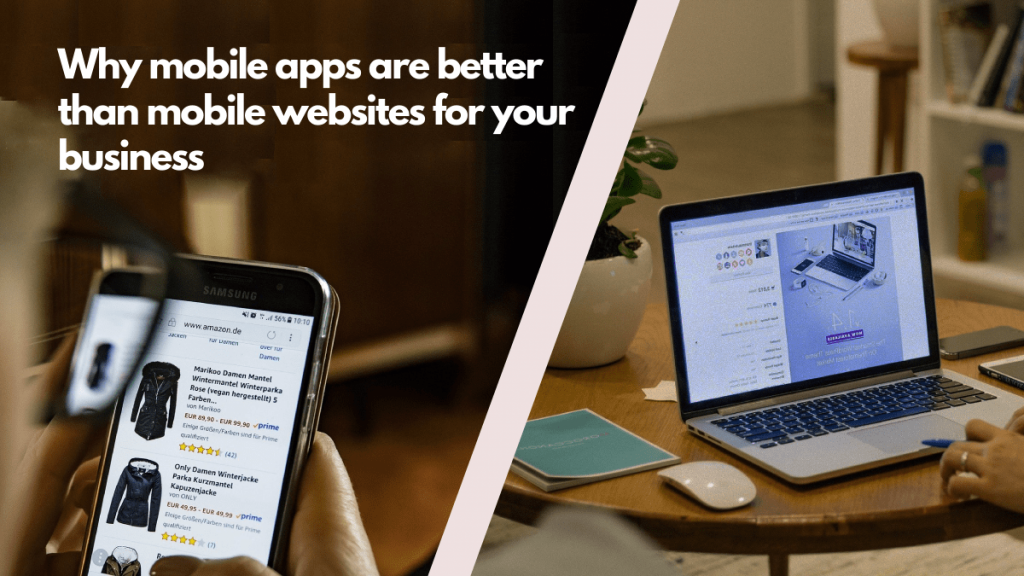It’s 2021 and almost every business owner knows the importance of a good website. Purchasing the domain name and setting up a website is often the first step any new business owner makes. Websites play a huge role in introducing your business to new customers and is the new business card (Here’s a tip: Add a QR code to your website on your card). It is the first step to create an online presence for your organisation. But most businesses are still reluctant to take the next step: building a mobile app for their business. The reality is that mobile apps have many advantages over websites, and is in most situations better than a website.
A little bit of story before we begin
I spent the better part of the last year talking to business owners and stakeholders all over the globe. Among the many things we discussed, a mobile app for their business was a common theme. Albeit a minority, most businesses had a good website(If you don’t, let’s fix that). They have invested quite a bit into their website, and understandably didn’t want to spend more on a mobile app they felt wasn’t quite necessary.
So here’s the answer to that.
A mobile app brings back customers for more
Here’s the deal, a website gives your customers the first impression. It will probably bring you your first sale. Unless you’re a popular brand with a huge brand awareness, a website will help more customers find you. Websites beat apps by a huge margin in this area. Most people aren’t going to install an app the first time they hear about you. And an app isn’t going to do much in terms of SEO.
But it’s difficult to bring a customer back with a website. Once the customer leaves the website, they are most likely to return only the next time they need something.
That’s not the case with a mobile app.
Once installed, most customers aren’t going to uninstall your app for a long time. This presents an amazing opportunity to run marketing campaigns at almost no cost. Running google ads, or a social media campaign will be expensive and will need a lot of resources. Running a campaign on your app? As simple as pushing a notification(provided you’ve built a robust app).
A mobile app brings back customers to your business.
Better customization
Of course, if a customer logs in to your website, you can give them custom recommendations. But that doesn’t always happen on websites. And since customers tend to use apps more than websites, you’ll also get better data on their preferences.
Even for business to business companies, the extra touch can go a long way. Greetings on their birthdays, or sending an invite to a webinar or a conference can go a long way in building a long lasting business relationship.
Mobile app can use more sensors
All right, some websites can use cameras and GPS sensors too. But certainly not to the extent to which a mobile app can be used.
With more sensors, you can bring in a lot more features to a smartphone app. For example, if you have a home decor business, you can build an AR app. Customers can see how different products will look in their homes. Major sports brands have developed apps that can help users track their workouts while using their products. Some of these brands offer discounts for users walking 1000 steps a day for a month or running a kilometre a day during promos.
As you can see, smartphone sensors open up a whole lot of possibilities compared to a website. And while websites can do that, a smartphone app does the job way better.
A better branding is possible on a mobile app more than on a website
As demonstrated by the example of sporting brands, apps offer a much better branding experience than a website. It offers a better way to connect to your customers. Even for B2B, mobile apps are the best way to make customers aware of your products and services.
Rather than just showcase what you’re offering, a mobile app can give your customer an experience of your business. For example, imagine you’re selling a product like an electronic gadget, or DIY furniture sets. By offering interactive installation guides and active customer support through your app, you’re telling your customers you’re there every step of the way. Sure websites can do this, but let’s face it, it’s not that clean.
More than just bringing in customers, apps can help you retain the customers. And of course, if you’re offering an internet connected product, you can improve customer loyalty by offering continuous over-the-air updates way after their purchase.
Mobile apps are more speedy and user-friendly
Here’s where apps blow websites out of the water. Everything a website can do, an app can do faster. And in a much more user-friendly way.
One of the problems with websites is their reliance on connectivity. Even moving to a different page takes time. And most websites can’t function without an internet connection.
Now let’s face it, most smartphone users have a constant internet connection. But the slow speed of the websites really affects the user experience.
Another problem is that websites are dependent on the browser for the user experience, and even the user interface. Simple things like the back button are complicated on browsers. On a mobile app you can offer a consistent UI to your users. As you add more functionality to your website, the more complicated it gets, and more frustrating it becomes to the user. This is why most banks are pushing their clients to use their apps.
Final thoughts
Get started with a website. When you’re starting a new business, set up a website first. But invest in an app as you scale up. Websites bring in customers, apps retain them.
